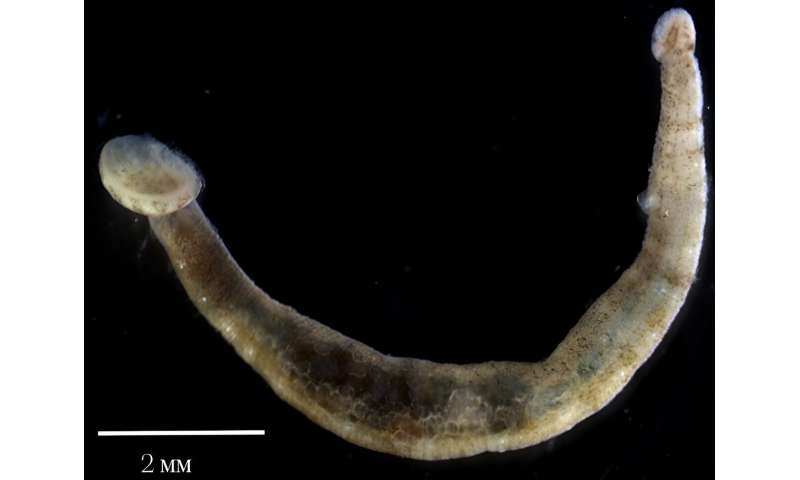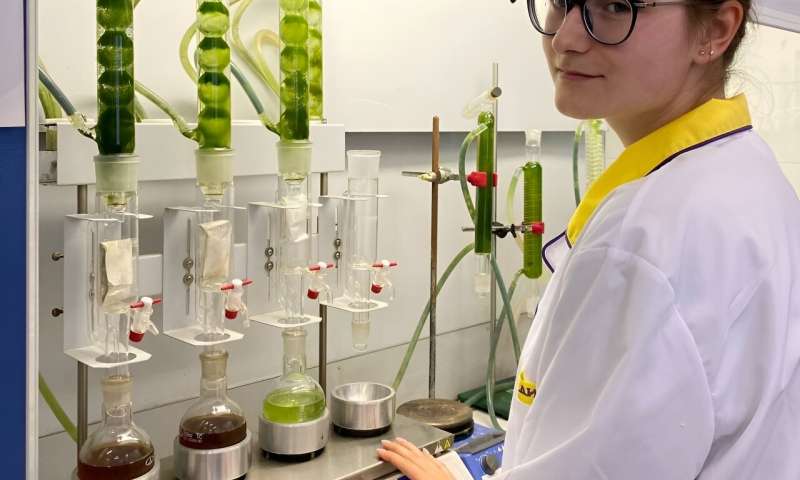Fern saves fish from microbes and leeches

Scientists from Immanuel Kant Baltic Federal University have found out unique properties of Asian plant, that help to struggle with vermin at fish farms. Extract of fern contains a lot of useful chemical compounds, that combine antibacterial and antiparasitic activity, and can soon become safe alternative to chemicals. The research, supported by grant of Russian Scientific Fund (RNF), is published in magazine Molecules.
Vibriosis is a bacterial disease, that presents a significant threat to fish and shell-fish, bred in aquacultures. In general, it is caused by several kinds of bacteria from Vibrio family. Microbe is able to infect a wide range of fish, including an important industrial one—ocean perch. Apart from vibriosis, aquaculture faces the problem of vermintation. One of the well-known examples is a parasitic leech Zeylanicobdella arugamensis, that lives in tropical regions. Fish, infected by that leech, perish very quickly, and that suffer damage to fish farms. Besides this, as scientists think, this parasite carries in itself bacteria Vibrio, that was mentioned earlier. Thus, parasites, whether microbes or leeches, suffer a significant damage to aquaculture and lead to essential economic losses.
Scientists from Immanuel Kant Baltic Federal University together with colleagues from Malaysia have studied useful features of fern Nephrolepis biserrate and found out that its extract effectively struggles with parasites and microbes, that infect fish in aquacultures. It must be noted that nowadays only chemicals are use to struggle with parasites. They are effective, but harm ecology and human health, whereas substances, extracted by scientists from plants, are less dangerous. Moreover, specialists have found out that fern extract suppresses the growth of bacteria Vibrio in 2.5 times more effectively, killing them within a radius of 19 mm, than methanol and chloroform that are able to suppress activity of vermin only in a radius of 8 mm.

Scientists have analyzed chemical composition of extract of fern and found out several classes of substances that have activity against parasites. Phenol and flavonoids are of the most frequent occurrence. These compounds were discovered also in other plants, and their biological activity is connected with antimicrobic and antiparasitic effect. Among other chemical matters scientists have found various aromatic compounds, such as cinnamylic acid, that successfully struggles with parasites. Nicotinamide should also be mentioned, it is a vitamin from group B, that demonstrates activity against parasite Trypanosoma cruzi that is dangerous as for people and also for animals, because it causes gastrointestinal disease known as Chagas disease.
"The results of research are very promising and witness about potential of aqueous extract of fern against Vibrio and leeches. The analysis has enabled to find out 118 compounds, among which there are a lot of metabolites with antibacterial and antiparasitic activity, for example, cinnamylic acid and nicotinamide. Obtained results enable to suggest that aqueous extract of fern can be used as a natural alternative in struggle against infections in systems of aquaculture. It is obvious that aqueous extract of fern is a promising functional product for fish farming and aquaculture. It is possible to produce on its base feed stuff for growing fish and also products for improving quality of aquatic environment",—tells Olga Babich, director of Immanuel Kant Baltic Federal University, Research and Education Center "Industrial Biotechnologies", leader of the grant of RSF.
Provided by Immanuel Kant Baltic Federal University